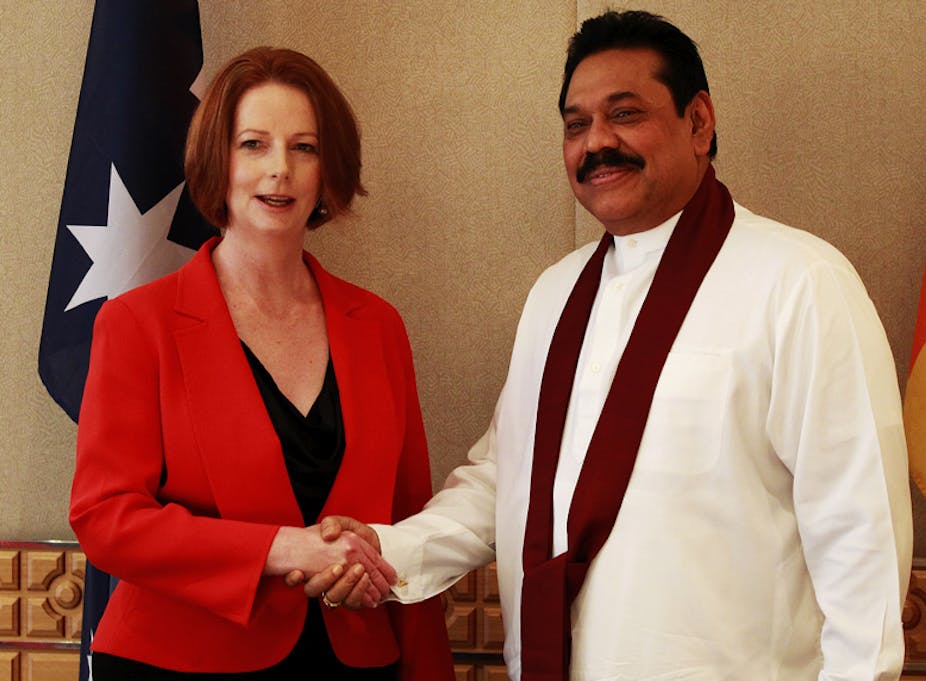CHOGM As the meeting between Commonwealth Heads of Government kicks off in Perth, a row is brewing over the idea for a new Commissioner on democracy, human rights and the rule of law. Holly Cullen from the University of Western Australia’s Faculty of Law faculty examines the proposal.
Australia, the UK and Canada are leading the campaign for a new commissioner to police human rights in the Commonwealth.
But the proposal from the Eminent Persons Group will struggle to be passed at CHOGM.
Sri Lanka’s President has proved a controversial invitee in Perth, as he defends himself against allegations of war crimes. And his country isn’t the only reluctant one to have the commissioner. South Africa and Uganda are among the other states who worry the new role would be too intrusive in their domestic affairs.
Role of the Commissoner
The Commonwealth established the Eminent Persons Group two years ago to help it chart the course over the next few years.
The group’s report, recommends the establishment of a Commissioner following concerns that the Commonwealth Ministerial Action Group (CMAG) is an insufficient response to violations of human rights in Commonwealth countries.
It sets out that the Commissioner should have the power to investigate human rights abuses and report to the CMAG and the Secretary General.
The Commissioner would also be expected to develop capacity-building and early-warning strategies.
It is clear that the Group intends that the Commissioner would have a diplomatic and promotional role, rather than a quasi-judicial one.
Unanswered questions
Nonetheless, some key questions go unanswered.
What standards of democracy, rule of law and human rights will the Commissioner monitor?
As part of the draft Charter for the Commonwealth, one of the Group’s other key recommendations, the ideas of democracy, rule of law and human rights are set out in detail.
These details in the Charter will be an essential pre-condition for the success of the Commissioner’s work.
What obligations will be placed on Commonwealth states to cooperate with the Commissioner’s work?
And, more practically, what resources will be put at the disposal of the Commissioner?
International comparisons
It is worth comparing this proposal with similar Commissioners in other international organisations, who act within a framework of binding international human rights obligations.
Commonwealth-specific human rights undertakings are as yet limited when compared with the background human rights commitments shared by members of the Council of Europe.
Its Commissioner for Human Rights’ mandate operates against a background of one of the oldest civil and political rights treaties in existence, and other treaties on issues such as social rights, human trafficking and data protection.
The Commissioner is, therefore, a complement to existing international legal obligations and procedures, and plays more of a promotional role.
His country visits are designed to raise standards of human rights in those countries, although this has in practice included criticism of human rights violations.
The present Commissioner, Thomas Hammarberg, previously held human rights posts in the United Nations and was also Secretary General of Amnesty International.
Confidence to criticise
If the the proposal for a Commissioner is accepted by the Commonwealth which, based on recent news reports, looks unlikely, the ideal would be for a person with a strong human rights background, like Hammarberg, to hold the post.
The Eminent Persons Group report recommends that a Commissioner should be “a Commonwealth citizen of exceptional experience and reputation, with knowledge of the issues and capable of sensitive diplomacy.”
A Commissioner playing this promotional and diplomatic role would be dependent on Commonwealth governments in order to engage in fact-finding that would be the essential background to any recommendations to the Secretary General.
The Commissioner could only enjoy the confidence of the entire Commonwealth if he, or she, would be as likely to criticise the policies of any member state.
If Australia wishes to pursue the adoption of a Commissioner for Democracy, the Rule of Law and Human Rights, it must be willing to accept that its policies will inevitably also come under scrutiny.
With her recent record on human rights issues, that should give Julia Gillard food for thought.
Read more:
Our complex relationship with India
That sinking feeling: will the Pacific be heard at CHOGM 2011?
Can CHOGM take the reins in the face of NCD disaster?
A long line of discrimination, but should the succession to the throne be changed?
Why the Commonwealth must take action against Sri Lankan war crimes

